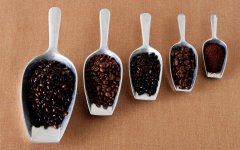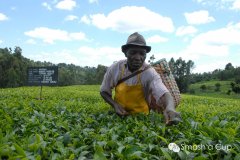[World-class Coffee Competition] Barista, Hand Brewing, Cup Testing, Roasting
Christian Ullrich, Stefanos Domatiotis, Matt Perger, Pang-Yu Liu, Yu-Chuan Jacky, Stavros Lamprinidis, these people are not the superstars you see in Hollywood movies, but they are really famous in the world of coffee. On Livestream, Youtube and Youku, these people have viewed more than millions of videos. They are the champions of world-class coffee competitions, most of which are organized by the World Coffee Association (World Coffee Events, WCE). They naturally become the stars of WCE. Every year, thousands of coffee professionals and coffee lovers from all over the world gather together to applaud the superstars of the global coffee industry. These superstars come from different countries and stand out from various WCE-authorized national competitions.
I would like to thank WCE for providing a world-class platform for top talents in the industry to discuss coffee skills, convey coffee concepts and exchange coffee experiences. If you want to be a world champion, you must pass the strict judgment of the judges, who come from all over the world, have received professional training, and have obtained the industry qualification certification. WCE, co-founded by the American boutique coffee association (Specialty Coffee Association of America, SCAA) and the European boutique coffee association (Speciality Coffee Association of Europe, SCAE), is a pioneer in hosting world-class coffee competitions. WCE aims to promote the exchange of global boutique coffee associations and enhance the professional standards of the industry by hosting various competitions. WCE is currently the most influential world-class coffee organization, with more than 50 member States electing their national champions to WCE competitions.
2014 World Coffee Championship list
World Barista Competition: Hidenori Izaki (Japan)
World flower draw contest: Christian Ullrich (Germany)
World hand Coffee Competition: Stefanos Domatiotis (Greece)
World Coffee Creative Competition: Matt Perger (Australia)
World Cup Test Competition: Liu Bangyu (Taiwan)
World Coffee Baking Competition: Lai Yuquan (Taiwan)
World Turkish Coffee Brewing Competition: Stavros Lamprinidis (Greece)
These events are usually held in conjunction with major industry forums and world-class industry exhibitions, co-hosted by SCAA and SCAE. Sometimes, some of these events are hosted by the national coffee industry association of the host country. These events usually last for many days, with contestants, judges and volunteers from various countries participating. Spectators will fully experience the delicacy of the on-site display of boutique coffee. Baristas who can present the perfect coffee flavor with their individual skills and bring an exciting live performance are more likely to be favored by competition awards.
World Barista Competition (World Barista Championship, WBC)
It is the final event of the annual barista competition in various countries and regions, attracting the attention of the whole world. It focuses on promoting the quality of coffee and the professional skills of baristas. Every year, barista champions from more than 50 countries will complete the production of 4 espresso, 4 cappuccino and 4 homemade coffee drinks in 15 minutes of live display. The WCE certified judges will judge the contestants from the aspects of beverage flavor, professional skills, cleanliness, innovation ability, overall performance and so on. Among them, self-made coffee drinks encourage baristas to give full play to their creativity and use their rich professional knowledge to create personalized drinks that can reflect their own tastes and experiences. In the end, only one contestant can win the title of world barista champion.
World draw Competition (World Latte Art Championship, WLAC)
It is a competitive platform that pays attention to artistic performance, and baristas are required to complete the required links of the competition. The classic collocation of espresso and milk shows the barista's creative design on the surface. The competition works will be judged from the aspects of beverage taste, pattern stability and pattern innovation. The top six contestants will enter the final competition. In the final round, contestants will make two optional pattern Macchiato, two optional pattern lattes and two prescribed pattern lattes. The judges will make a comprehensive judgment on the visual effect, innovation, stability, complexity and the overall performance of the barista. The contestant with the highest score will win the world flower competition.
World Baking Competition (World Coffee Roasting Championship, WCRC)
The contestants' performance will be judged in three aspects, including the rating of raw coffee beans, setting the optimal roasting curve of specified coffee beans and the roasted products of coffee beans. The trick of a real coffee roaster is to make full use of his own experience and knowledge to set and perform a perfect roast. The baked products will be blindly tested by professional judges to determine the final score.
World hand Coffee Competition (World Brewers Cup,WBrC)
It is a competition for coffee hand extraction skills, which aims to improve the professional standards of manual coffee extraction skills and services. Contestants can choose any kind of manual coffee extraction tools, such as trickling pot, pressure pot, siphon pot, etc., to show three different coffee drinks to the judges. The fluency of the extraction process and the service process will be included in the evaluation. The essence of this competition is to bring baristas back to their roots and make a cup of high-quality black coffee for customers.
Finally, I would like to introduce an important event in WCE, that is, the World Turkish Coffee Competition (The Cezve/Ibrik Championship). The Turkish coffee maker (Cezve/Ibrik) is a coffee maker made for a specific way of brewing coffee, which is very popular in Eastern Europe, the Middle East and North Africa. The body of the pot can be made of metal or ceramic, the rim of the pot is designed to make it easy to filter out coffee, and its biggest feature is that it has a long handle. The event not only shows Turkey's unique way of brewing coffee, but also promotes a unique cultural tradition in the form of a competition. Participants are encouraged to use their own coffee pots to present this ancient way of brewing coffee in the competition. The next World Turkish Coffee Competition will be held in Athens, Greece, on February 6, 2015.
The 2015 World Barista Competition will be held at the same time as the American Fine Coffee Association Exhibition (the SCAA Expo) in Seattle, USA. The World Cup Test Competition, the World Coffee roasting Competition, the World Coffee Competition, the World hand Coffee Competition and the World Turkish Coffee Competition organized by SCAE will be held in Gothenburg, Sweden from June 16 to 18, 2015.
In addition to the above events hosted by WCE, the Japan Fine Coffee Association has established the World siphon Barista Competition (World Siphonist Championship, WSC) based on its traditional siphon pot competition. This year, seven siphon pot champion baristas from different countries competed on WSC, and Miss Tomoto Ueno from Japan won the championship. According to the records of previous competitions, not all the winners of the siphon barista contest came from Japan. Miss Li Yating from Taiwan won the first WSC championship held in 2009. The winner of the 2013 World siphon baristas Competition is Miss Liang Haien from Hong Kong.

Important Notice :
前街咖啡 FrontStreet Coffee has moved to new addredd:
FrontStreet Coffee Address: 315,Donghua East Road,GuangZhou
Tel:020 38364473
- Prev

Coffee raw beans roast color change roasted coffee beans
Raw beans constantly change color during baking, depending on the number of brown pigments and the size of molecules. Brown pigments can be classified according to the size of molecules, shallow baking will mostly produce small molecular pigments, with the deepening of baking, the total amount of pigments will increase, and the proportion of macromolecular pigments will also increase. Most of the lightly roasted coffee beans contain yellow
- Next

This article will take you into the world of coffee, a complete introduction to fine coffee.
Most Arabica coffee beans mature from June to August and Robart coffee beans from September to October. Therefore, although in some countries where the dry and wet seasons are not obvious, such as Colombia and Kenya, there are two flowering periods a year, that is, two harvests, strictly speaking, only once a year. Due to different regions, the harvest time is also different. North of the equator (eg Ethiopia
Related
- Beginners will see the "Coffee pull flower" guide!
- What is the difference between ice blog purified milk and ordinary milk coffee?
- Why is the Philippines the largest producer of crops in Liberia?
- For coffee extraction, should the fine powder be retained?
- How does extracted espresso fill pressed powder? How much strength does it take to press the powder?
- How to make jasmine cold extract coffee? Is the jasmine + latte good?
- Will this little toy really make the coffee taste better? How does Lily Drip affect coffee extraction?
- Will the action of slapping the filter cup also affect coffee extraction?
- What's the difference between powder-to-water ratio and powder-to-liquid ratio?
- What is the Ethiopian local species? What does it have to do with Heirloom native species?

